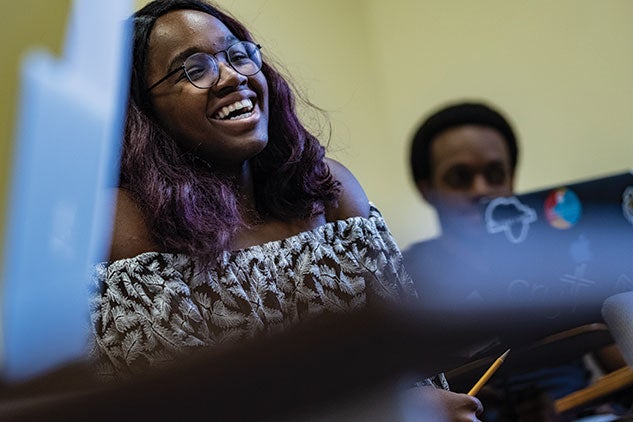
A Composed Assignment
History course combines primary sources and creativity

Students have traded textbooks for primary sources and traditional papers for creative assignments in an innovative history class, Fighting the Atlantic Slave Trade. This firsthand approach to learning inspired Martel College senior Munachimso “Muna” Uzodike, a kinesiology major, to turn a weekly assignment into an original, copyrighted song, “I Will Abstain.” The moving hymn was written from the perspective of a preacher’s wife who was working with an abolitionist society in late 18th-century England.
A role-playing element was central to the design of the class, taught by historian Daniel Domingues. Domingues’ students adopted pseudonyms and developed characters over a series of assignments throughout the semester. Uzodike chose the character of a preacher’s wife. As the daughter of pastors who run a church in The Woodlands, it was in some ways a natural persona for her to assume. Yet it still required a shift in perspective, to that of a woman living in a foreign society some 200 years ago. “It’s another dimension of learning, and I definitely haven’t experienced that in other classes before,” Uzodike said.
All of Domingues’ students consulted primary sources for their research. “In a textbook, what readers get is already an interpretation,” Domingues said. “It’s part of our job here to provide them with these primary sources and to guide students in interpreting them, because that’s one skill we provide here as a department: critical thinking.” In their weekly assignments, students could opt to write a standard college paper after reading, for example, a series of abolitionist diary entries or, as an alternative, respond with a poem, sermon, pamphlet, sculpture or some other artistic undertaking.
“The character is the wife of an evangelical pastor, but she writes as well,” Uzodike said. “So I felt like socially she probably wouldn’t have been writing a sermon, but a song — something that is meaningful and that she relates to on a faith level, also as a display of her love for writing and her passion toward the movement.” Further inspiration came from a 1788 sermon preached by Thomas Bradshaw and a firsthand account written in 1787 by Ottobah Cugoano, an emancipated slave living in England. “I’ve written papers before and professors thought they were good, but this is a bit different because it’s not just analyzing something — this is something I’ve created,” Uzodike said.
— Katharine Shilcutt
